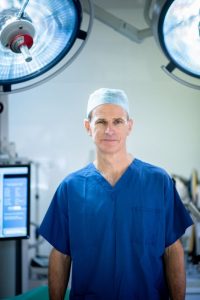Head of ORI, Professor Robert Middleton, has been appointed as one of the Medical Commanders at Poole Hospital NHS Foundation Trust during the COVID-19 pandemic. Each Medical Commander is available for 24 hours a day to respond to any changes that require medical decisions, in order to provide a safe and effective service for patients.
Professor Middleton:
“For over twenty years, I’ve done the same job every day of the week, and around 90% of my work has been with patients, either operating or seeing them in the clinics, or doing ward rounds. That has changed entirely, and now 100% of my work involves management and organising a response to the current pandemic. All my elective work and clinics have stopped because we have been freeing up hospital space for patients with COVID-19.”
“For the last ten years I have had the role of Clinical Director of Trauma at Poole Hospital. I have now taken on the role of one of the Medical Commanders at the hospital. When there is a serious incident, the hospital sets up an incident room so that it can respond to the emergency, for example, organise extra doctors and nurses, extra equipment or order more blood. We have always been prepared for incidents, but previously they have been short incidents, lasting for an hour or a day or two. This is very different, we think this emergency will go on for weeks or months. The hospital has appointed four senior doctors to become Medical Commanders. We take it in turn to be in the incident room, where with the Nursing Commander and Management Commander, we respond to problems as they arise.”
“We spend twelve hours a day in the board room, 8am-8pm. We provide a presence on site during the day, and then overnight we are available on call. I am extremely lucky to have some very good colleagues to work with, and everyone is pulling together. My life has changed from spending most of my waking hours in theatres to spending the day in a board room. For the present time, that’s the best way I can make a contribution. But we must appreciate the doctors, the nurses and the support staff who are working on the front line looking after patients. It’s great to be able to support them, to make sure they have all the equipment they need to do their job.”
“My hip fellows are also contributing by taking up new roles elsewhere, for example, helping with trauma lists whilst their elective work has stopped, working in fracture clinics, minor injury units, or providing virtual clinics for patients.”
“When not on duty, the temporary closure of the campuses at Bournemouth University has given me the opportunity to complete outstanding research, develop remote teaching programmes, and apply for grants to fund future research after the pandemic.”






